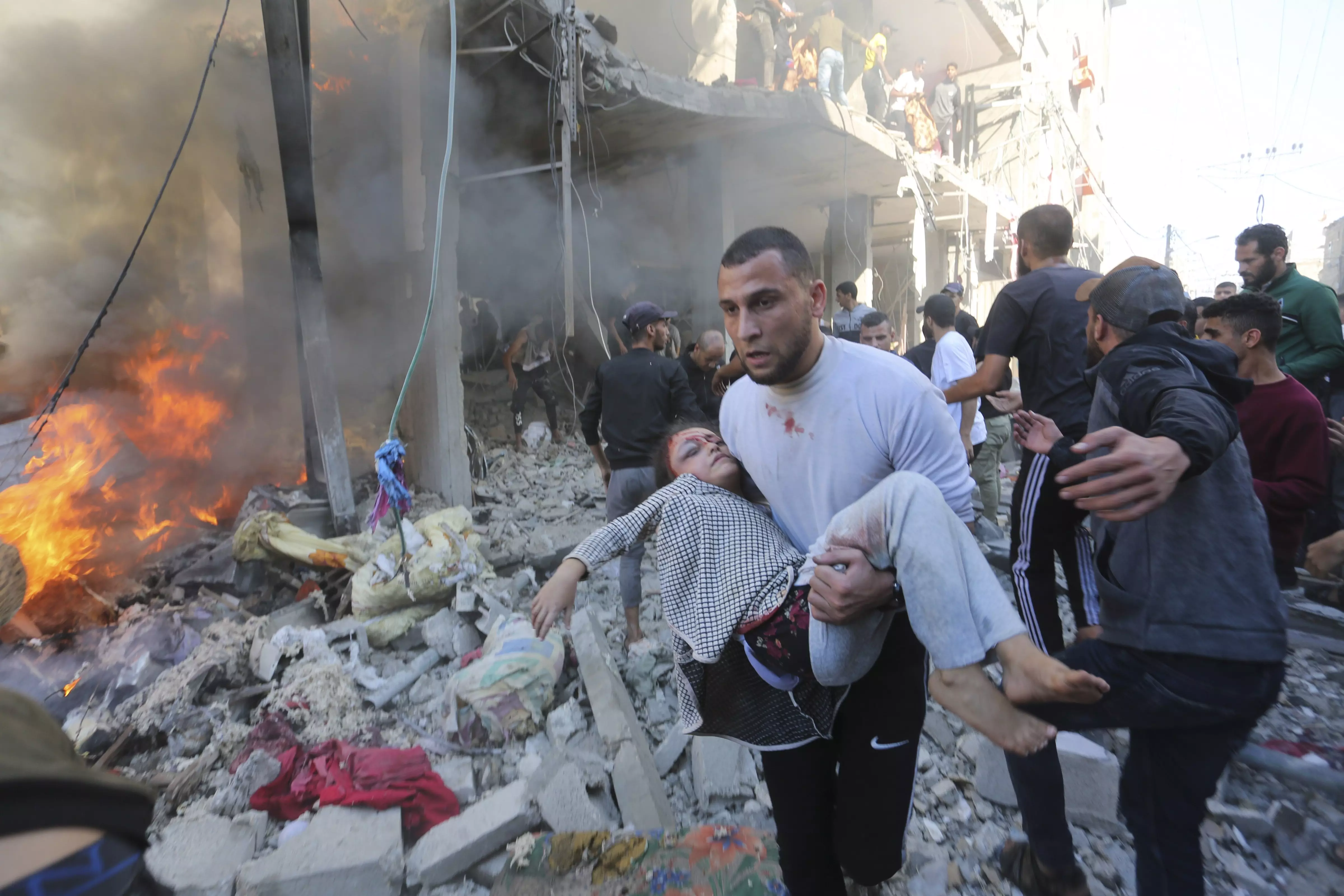
Israel-Hamas war | Patients, staff, homeless leave Shifa Hospital as raid continues
So far, Israel's ground assault has focused on northern Gaza; if the assault moves into the south, it is not clear where the Palestinians can go

Many patients, medical staff, and the displaced left Gaza’s largest hospital, which was taken over by Israeli forces earlier in the week, on Saturday (November 18), Gaza health officials have said.
Palestinian officials and the Israeli military offered conflicting versions about what prompted the mass exodus from Shifa Hospital.
Health officials said they received an evacuation order from the military on Saturday morning, while the military said it had offered safe passage to those hoping to leave. Before the departure, several thousand people, including medical patients in serious condition, were trapped in Shifa in dire conditions.
Internet, phone services partially restored
During the day, Israel partially restored Internet and phone services in the Gaza Strip after strident criticism from Jordan and Turkey, ending a telecommunications blackout that forced the UN to stop humanitarian aid deliveries as it could not coordinate its convoys.
Gaza's main power plant shut down early in the war and Israel cut off electricity supply. This makes fuel vital to power the generators needed to run not only the telecommunications network but also water treatment plants, sanitation facilities, hospitals and other critical infrastructure.
Israel said it would allow in 10,000 litres of fuel daily for communications service to continue, according to the US State Department. It also agreed Friday to an American request to let a “very minimal” amount of fuel into Gaza daily for humanitarian purposes.
Israeli authorities said it would amount to 60,000 litres a day for the UN.
The UN said this is 37 per cent of the fuel needed by it to support its humanitarian operations including food distribution and the operation of generators at hospitals and water and sanitation facilities.
In the meantime, an Israeli airstrike hit a residential building on the outskirts of the town of Khan Younis in Gaza, killing 26 Palestinians, according to a doctor at a hospital.
Gaza fighting
The Israeli military earlier told civilians to flee northern Gaza, the target of its ground offensive, but also kept up its bombardment in the southern evacuation zone where Khan Younis is located.
Israel has signalled plans to expand its offensive south while continuing operations in the north including Gaza City.
The Israeli troops are still searching the biggest hospital, Shifa, for traces of a Hamas command centre Tel Aviv alleges was located under the building — a claim the Hamas and the hospital staff deny.
The war, now in its seventh week, was triggered by the Hamas' October 7 savage attack in southern Israel in which its militants killed about 1,200 people, mostly civilians, and abducted some 240 civilians.
More than 11,400 Palestinians have been killed in the war, two-thirds of them women and minors, according to Palestinian authorities. Another 2,700 are reported missing. Israel says it has killed thousands of Hamas fighters.
The UN has warned that Gaza's 2.3 million people are running critically short of food and water. Israel has also blocked food, water and other supplies except for a trickle of aid from Egypt.
The Palestinian telecommunications provider said it was able to restart its generators after UNRWA donated fuel.
Angry Israelis
In Israel, the government is under heavy public pressure to show it is doing all it can to bring back people abducted by the Hamas.
Thousands of marchers — including families of over 50 hostages — embarked on Friday on the fourth leg of a five-day walk from Tel Aviv to Jerusalem, chanting, “Bring them home!”
Hamas has offered to exchange all Israeli hostages for some 6,000 Palestinians in Israeli jails, which the Cabinet rejected.
So far, Israel's ground assault has focused on northern Gaza. If the assault moves into the south, it is not clear where the Palestinians can go. Egypt has refused to allow a mass transfer onto its soil.
Jordan's foreign minister on Saturday offered a blistering criticism of Israel's war on Hamas, describing it as “blatant aggression” against Palestinian civilians that threatens to engulf the wider Middle East.
Ayman Safadi alleged that Israel was committing “war crimes” by besieging the Gaza Strip and cutting off food, medicine and fuel shipments.
Bahrain slams Israel
“All of us have to speak loud and clear about the catastrophe that the Israeli war is bringing, not just on Gaza, but on the region in general,” he told the International Institute for Strategic Studies' Manama Dialogue summit in Bahrain.
However, Brett McGurk, the White House's National Security Council coordinator for the Middle East, said "a release of large number of hostages would result in a significant pause in fighting ... and a massive surge of humanitarian relief.”
Meanwhile, Turkish President Recep Tayyip Erdogan and German Chancellor Olaf Scholz on Friday aired deep differences over the war between Israel and Hamas.
Erdogan this week called Israel a “terrorist state” intent on destroying Gaza with all of its residents. He described Hamas militants as “resistance fighters”.
Scholz has described Erdogan's accusations against Israel as "absurd.”
Erdogan suggested that Germany was unable to criticize Israel because of the Holocaust.
“I speak freely because we do not owe Israel anything. If we were indebted, we could not talk so freely," he said. “Those who are indebted cannot talk freely. We did not go through the Holocaust, and we are not in such a situation.”
(With agency inputs)

